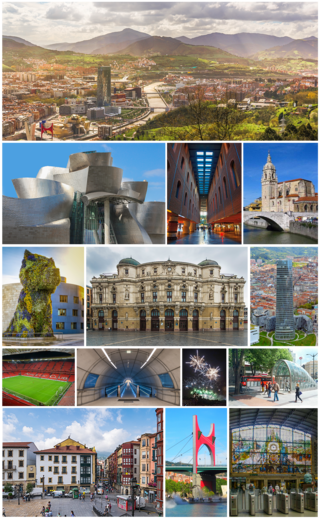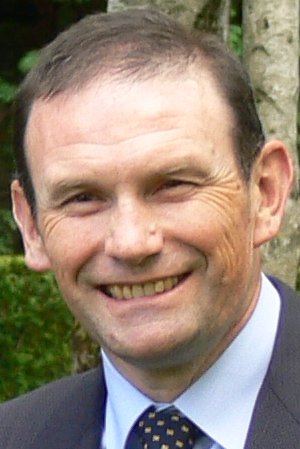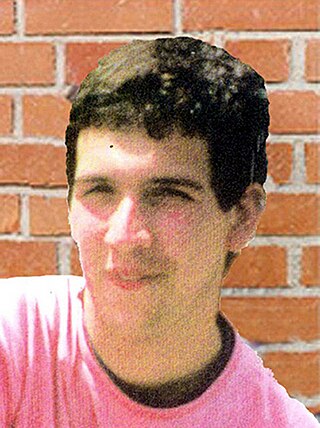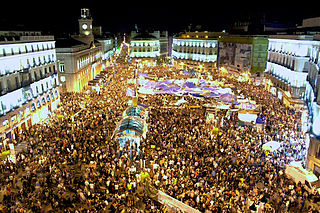
Bilbao is a city in northern Spain, the largest city in the province of Biscay and in the Basque Country as a whole. It is also the largest city proper in northern Spain. Bilbao is the tenth largest city in Spain, with a population of more than 347,000 as of 2023. The Bilbao metropolitan area has 1,037,847 inhabitants, making it the most populous metropolitan area in northern Spain; with a population of 875,552, the comarca of Greater Bilbao is the fifth-largest urban area in Spain. Bilbao is also the main urban area in what is defined as the Greater Basque region.

The Ertzaintza is the autonomous police force for the Basque Country, largely replacing the Spanish Policía Nacional and Guardia Civil. An Ertzaintza member is called an ertzaina.

The Bilbao metro is a rapid transit system serving the city of Bilbao and the region of Greater Bilbao. Lines 1 and 2 have a "Y" shape, as they transit both banks of the river Ibaizabal and then combine to form one line that ends in the south of Bilbao. Line 3 has a "V" shape connecting the municipality of Etxebarri with the Bilbao neighbourhood of Matiko; the apex of the "V" is Zazpikaleak/Casco Viejo station, where all three current lines meet. The metro is connected with the Bilbao tram, Bilboko Aldiriak, Euskotren Trena, Feve, Renfe long-distance trains, and Bilbao's bus station. All three lines use metre gauge.
Bilbao BBK Live is a rock and pop music festival that takes place annually in the city of Bilbao, Spain. Since its beginnings, the festival is held in its entirety on a special complex built specifically for the event on the slopes of Mount Cobetas, located southwest of the city.

The 1998 Basque regional election was held on Sunday, 25 October 1998, to elect the 6th Parliament of the Basque Autonomous Community. All 75 seats in the Parliament were up for election.

Moyua is a station on lines 1 and 2 of the Bilbao metro. The station is located in the neighborhood of Abando, in the district with the same name. The station is located under the Moyua Plaza, named after Federico Moyúa, mayor of Bilbao during the early 20th century. It opened on 11 November 1995.
The Basque derby is the name of the football local derby between Real Sociedad and Athletic Bilbao. It embodies the inter-city rivalry between Bilbao and Donostia-San Sebastián, respectively the capitals of the neighbouring provinces of Biscay (Bizkaia) and Gipuzkoa in the Basque Country region of Spain. It is also occasionally referred to as the AP-8 derby, referring to the name of the highway which connects the cities.

A van bomb went off on 19 May 2008 outside a boat club in the town of Getxo, Biscay in the Basque Country, Spain. The attack caused serious damage to the club, as well as nearby buildings and structures. No one was killed or injured after a warning call from the Basque separatist organisation ETA. On 31 May, the organisation claimed responsibility for the bombing.

Arkaitz Goikoetxea Basabe is a member of the Basque separatist organisation ETA. He began his violent activity at the age of 15 as a member of the street violence groups known as kale borroka. He was arrested several times between 2001 and 2002, and joined ETA in 2005.

The 1980 Ispaster attack was a gun and grenade attack by the Basque separatist organisation ETA which occurred on 1 February 1980 near the Basque town of Ispaster. The targets were a convoy of civil guards who were escorting workers and weapons from the nearby Esperanza y Cia Arms factory to Bilbao. A total of six civil guards were killed, while two ETA members were killed by hand grenades that they had thrown. The attack was the deadliest of 1980, the year when ETA killed more people than any other.

The Ullíbarri-Gamboa Reservoir (Basque: Uribarri Ganboako urtegia, Spanish: Embalse de Ullíbarri-Gamboa) is located in Álava, Basque Country, Spain. With a total capacity of 147.2 hm3 (5.20×109 cu ft), it is the largest reservoir in the Basque Country. Together with the nearby Urrunaga Reservoir, it provides water to the nearby city of Vitoria-Gasteiz and to Bilbao and its metropolitan area. The whole reservoir has been designated as a Natura 2000 site, and the southeastern end of the reservoir is also protected as a Ramsar wetland. It is also a popular leisure area, particularly for hiking and bathing.

The anti-austerity movement in Spain, also referred to as the 15-M Movement, and the Indignados Movement, was a series of protests, demonstrations, and occupations against austerity policies in Spain that began around the local and regional elections of 2011 and 2012. Beginning on 15 May 2011, many of the subsequent demonstrations spread through various social networks such as Real Democracy NOW and Youth Without a Future.

Since 1912, the Spanish football club Athletic Bilbao has had an unwritten rule whereby the club will only sign players who were born in the Basque Country or who learned their football skills at a Basque club. On occasion, youth players have also been invited to join due to ancestral links to the region, but no senior players have been signed based on Basque heritage alone.

Errekaleor is a neighbourhood on the periphery of Vitoria-Gasteiz, in the Basque Country, Spain. It sits on the plateau created by the Errekaleor river, which is part of the Green Belt of Vitoria-Gasteiz. From 2013 onwards, the area was occupied by squatters and became known as Errekaleor Bizirik. The project is based on the principles of workers' self-management, consensus based decision making, feminism, anti-capitalism and Basque cultural re-invigoration. The neighbourhood is the largest occupied space of its type on the Iberian Peninsula, with over 10 hectares of land and 150 inhabitants. Residents include children, the elderly, blue-collar workers, the unemployed, students, and teachers. The project includes an organic farm of 2 hectares, a bakery, a bar, a social centre, a library, a theatre, a free shop, a recording studio, and other projects.
Jesús María Pedrosa Urquiza. He was a Spanish politician victim of terrorism of ETA.

La Ingobernable is a series of self-managed social centres in central Madrid, Spain. The squats have been used by feminist, environmentalists, LGBTI, anti-racist and other cultural groups. Between 2017 and 2019, the La Ingobernable was based in a municipal building located at the corner of Paseo del Prado and Calle del Gobernador. It was then located at Calle Alberto Bosch 4, behind the Prado Museum from March until April 2020, when it was evicted during the state of alarm. In 2021, an Office for Social Rights was set up at Calle Cruz 5.

The 2024 Basque regional election was held on Sunday, 21 April 2024, to elect the 13th Parliament of the Basque Autonomous Community. All 75 seats in the Parliament were up for election.

Squatting in Spain refers to the occupation of unused or derelict buildings or land without the permission of the owner. In Francoist Spain migrant workers lived in slums on the periphery of cities. During the Spanish transition to democracy, residential squatting occurred in Spanish cities such as Barcelona, Bilbao, Madrid, Valencia and Zaragoza. From the 1980s onwards a new generation of squatters set up self-managed social centres which hosted events and campaigns. The 1995 Criminal Code among other things criminalised squatting, but failed to stop it. Social centres exist across the country and in Barcelona and Madrid in particular. In the Basque Country they are known as gaztetxes.

Chanti Ollin was a self-managed social centre in Mexico City, Mexico, between 2003 and 2017. It was occupied in 2003 by students from the 1999–2000 UNAM strike and participants in Okupa Che. It was a derelict five storey building at Calle Melchor Ocampo 424 in Cuauhtémoc. The name means "house in motion" in the Nahuatl language.

















